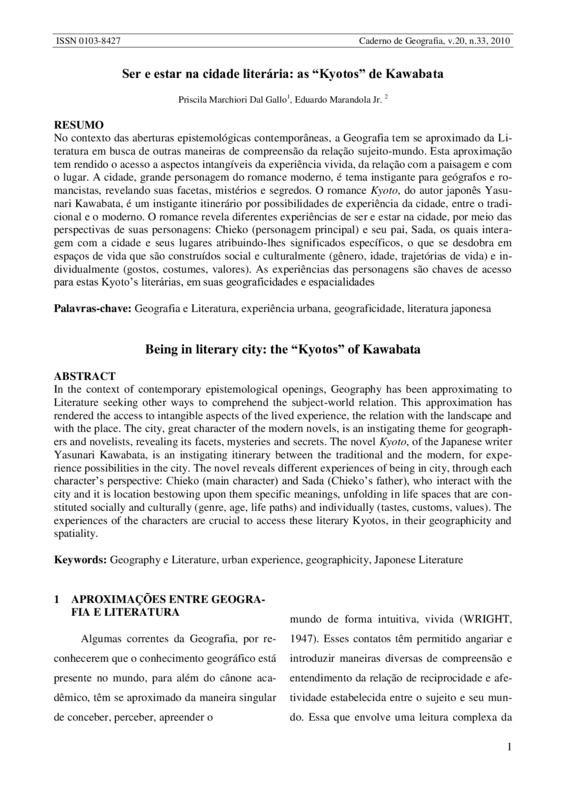Ser e estar na cidade literária: as “Kyotos” de Kawabata / Being in literary city: the “Kyotos” of Kawabata
Item
-
Título
-
Ser e estar na cidade literária: as “Kyotos” de Kawabata / Being in literary city: the “Kyotos” of Kawabata
-
Caderno de Geografia
-
UNICAMP
-
UNICAMP
-
Autor
-
Priscila Dal Gallo
-
Eduardo Marandola Jr
-
Assunto
-
Literatura
-
experiência urbana
-
geografia
-
geograficidade
-
literatura japonesa
-
Abstract
-
No contexto das aberturas epistemológicas contemporâneas, a Geografia tem se aproximado da Literatura em busca de outras maneiras de compreensão da relação sujeito-mundo. Esta aproximação tem rendido o acesso a aspectos intangíveis da experiência vivida, da relação com a paisagem e com o lugar. A cidade, grande personagem do romance moderno, é tema instigante para geógrafos e romancistas, revelando suas facetas, mistérios e segredos. O romance Kyoto, do autor japonês Yasunari Kawabata, é um instigante itinerário por possibilidades de experiência da cidade, entre o tradicional e o moderno. O romance revela diferentes experiências de ser e estar na cidade, por meio das perspectivas de suas personagens: Chieko (personagem principal) e seu pai, Sada, os quais interagem com a cidade e seus lugares atribuindo-lhes significados específicos, o que se desdobra em espaços de vida que são construídos social e culturalmente (gênero, idade, trajetórias de vida) e individualmente (gostos, costumes, valores). As experiências das personagens são chaves de acesso para estas Kyoto’s literárias, em suas geograficidades e espacialidades In the context of contemporary epistemological openings, Geography has been approximating to Literature seeking other ways to comprehend the subject-world relation. This approximation has rendered the access to intangible aspects of the lived experience, the relation with the landscape and with the place. The city, great character of the modern novels, is an instigating theme for geograph-ers and novelists, revealing its facets, mysteries and secrets. The novel Kyoto, of the Japanese writer Yasunari Kawabata, is an instigating itinerary between the traditional and the modern, for expe-rience possibilities in the city. The novel reveals different experiences of being in city, through each character’s perspective: Chieko (main character) and Sada (Chieko’s father), who interact with the city and it is location bestowing upon them specific meanings, unfolding in life spaces that are con-stituted socially and culturally (genre, age, life paths) and individually (tastes, customs, values). The experiences of the characters are crucial to access these literary Kyotos, in their geographicity and spatiality.
-
volume
-
20
-
issue
-
34
-
Páginas
-
1-21
-
Date
-
2010
-
Língua
-
pt
-
issn
-
2318-2962
-
título curto
-
Ser e estar na cidade literária
-
Rights
-
Direitos autorais


